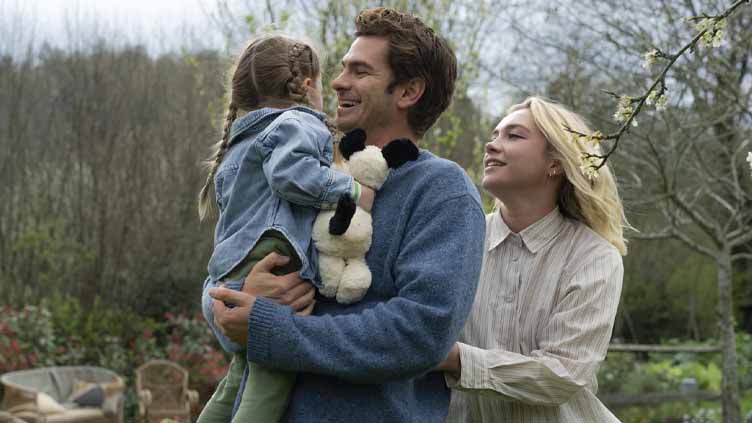Florence Pugh and Andrew Garfield on living through 'We Live in Time'

Entertainment
We’ve literally spent the last two days trying to unpack it and everybody wants us to unpack it
TORONTO (AP) — In “We Live in Time,” Florence Pugh and Andrew Garfield act an entire life of a relationship — a gamut of dating, falling in love, having a child and reckoning with cancer. So when Garfield recently went on a six-day retreat in the woods without his phone, one of his first texts was to his co-star.
“I came out and I sent Florence a message. I just felt compelled,” Garfield says. “When you reconnect with yourself, you reconnect with a bunch of stuff that matters to you. And I was just like, man, I haven’t let Florence know for a few months how much this film and this time with her meant to me.”
“We Live in Time,” directed by John Crowley ( “Brooklyn,” “The Goldfinch”) and penned by playwright Nick Payne, is the kind of movie that provokes an emotional response, including for its two stars. In playing their characters, Almut and Tobias, across a decade of time, “We Live in Time” poignantly condenses, and remixes into a non-linear narrative, a wide spectrum of life. Right alongside each other are sex and heartbreak, stolen moments and life-changing ones, birth and death.
It was enough to go through together as actors that Pugh and Garfield, when they spoke the morning of the film’s premiere at the Toronto International Film Festival last month, were still mourning it.
“I’ve never had this happen before in this way. We’ve literally spent the last two days trying to unpack it and everybody wants us to unpack it. And we don’t know,” says Pugh. “When we finished the movie, every scene that got closer and closer to the end, it became harder and harder to process that we weren’t going to be able to do it anymore.”
As two of the most in-demand actors of their generation, Pugh, 28, and Garfield, 41, have transformed themselves into all kinds of roles. They have donned Marvel costumes and joined period ensembles. Pugh was memorably outfitted in an elaborate flower dress for “Midsommar.” But “We Live in Time,” which A24 opens in theaters Friday, is a particularly unadorned view of two of the best actors working. It’s the first film in which Garfield has used his real voice.
“They’re two very beautiful creatures to look at, and have looked fantastically beautiful on screen — and do look very beautiful in this, by the way, just not in a glammed-up, aspirational fashion,” says Crowley. “They’re also both British actors who have made significant inroads in American cinema, and to some eyes, people might only know them from that. To have them speak in their own accents allowed those roles to fall back much closer to them.”
Chemistry can be a tricky thing to pin down. Crowley, whose 2007 film “Boy A” was Garfield’s feature film debut, cast Garfield first. After that came Pugh. Crowley prefers to keep dress rehearsals subdued in order to save the energy for shooting. But there were, he says, “flickers of something very special” between them.
“Much like two championship tennis players warming up, they couldn’t not once in a while hit the ball in an extraordinary way and have the other person hit it back,” says Crowley.
The experience has left both actors trying to hold onto something from “We Live in Time.” Garfield began the interview by opening up a book, offering a poem and then reading aloud Kabir’s “To Be a Slave of Intensity.”
“Just to remind myself that I’m a person, I guess,” he explains. “And because this film is about being as vitality alive as humanly possible. I think it’s really hard to remember how to do that sometimes — a lot of the time. In fact, it’s all set up against us doing it. So we need practices to keep us in touch with that.”
If “We Live in Time” is ultimately about making peace with the fleeting nature of all that’s precious, and trying to appreciate those moments when they’re happening, Garfield is doing his best to carry on that mentality and be grateful for the time he and Pugh had together.
“Every relationship is sacred. Every deep intimacy is sacred,” Garfield says. “And I think it’s such an amazing thing and a brave thing to do to actually address it and go: This is over now. We’re ending this now — much like Tobias and Alma have to do. So I think it all becomes life, art, imitation, whichever way around.”


